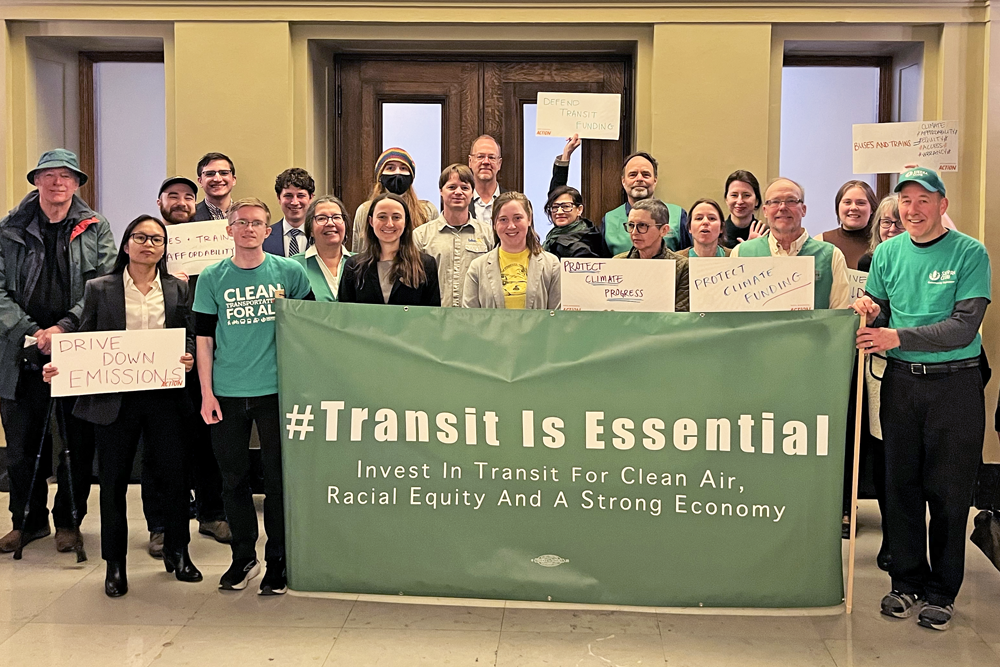We Can’t Delay in Driving Down Emissions: Defending Essential Climate Solutions at the State Capitol
Just two years ago, Minnesota made national headlines, passing a groundbreaking transportation bill that included transformative investments in public transit and urgently needed policies to protect our climate from transportation pollution. Now, some lawmakers are trying to destroy this hard-won progress with a bad transportation bill that would delay our Driving Down Emissions law, prioritizing highway expansion over the health of our climate and communities.
Minnesota’s Future–and National Reputation for Climate Leadership–Are On the Line
For generations, massive highways and car-centric urban planning have fueled the climate crisis while creating deep racial inequities in our communities. Minnesota legislators passed a nation-leading policy in 2023 and expanded it in 2024 to set our state on a fundamentally different course, shifting the type of roads we build and the way our communities develop to secure a safer and more climate-resilient future. Move Minnesota was proud to develop and champion this critical climate legislation with our elected allies and national partners.
To move Minnesota closer to a healthy and sustainable future, our Driving Down Emissions law requires the Minnesota Department of Transportation to assess the climate impacts of any highway project and then ensure that project aligns with our state’s goals for reducing greenhouse gas emissions and vehicle miles traveled. This includes reducing or offsetting highway pollution with projects that give our communities more and better options to bike, walk, roll, and use public transit. The law began applying to highway expansion projects as of this past February. But now some lawmakers want to delay implementation for years—risking the climate resilient futures that generations of Minnesotans are counting on and rolling back Minnesota’s reputation as a climate leader that other states across the country can look to for inspiration.
Climate Action Benefits Our Families and Communities in Minnesota
As the impacts of climate change grow more evident everyday, delaying action on climate solutions is simply not an option. According to the Insurance Federation of Minnesota, extreme weather events have already caused insurance premiums to increase by 366% in Minnesota since 1998, and the loss of winter ice cover on our Minnesota lakes in recent decades is affecting lake and fish health, outdoor recreation, local governments, and business owners.
Most Minnesotans know we have to act to protect the people and places we love. According to the University of Minnesota Climate Adaptation Partnership, more than 75% of state residents are concerned about climate change—and more than half are “hopeful that society will do enough to reduce the most severe impacts of climate change.”
From protecting our livelihoods to improving our quality of life, curbing climate pollution from transportation benefits everyone statewide. According to a 2023 analysis from RMI, reducing vehicle miles traveled (VMT) by 20% per capita by 2050 would prevent 2,800 deaths and 42,000 injuries by 2050, saving $54 billion in comprehensive costs for the state and taxpayers. Including reduced car operations cost and health benefits, we could save up to $91 billion by 2050. An updated 2024 analysis shows families seeing direct cost savings of $1,720 per year all from avoided gas, vehicle maintenance, and depreciation costs.
But, despite public will and overwhelming data, some state lawmakers emboldened by anti-science rhetoric at the national level, are trying to roll back the groundbreaking Driving Down Emissions law—and other recent climate victories like our historic investments in public transit and Minnesota’s 100% Clean Energy law—that will protect Minnesota families, our economy, and our communities from the most damaging impacts of a changing climate.
To Defend Climate Progress, Minnesota Lawmakers Must Reject the House Transportation Bill
On Monday, the Minnesota House of Representative is poised to vote on a transportation omnibus bill that would delay the implementation of greenhouse gas and vehicle miles traveled requirements for highway expansion projects and the full portfolio of trunk highway projects until 2028.
That’s out of touch not only with what Minnesotans want, but also with the state agency tasked with putting the policy into action. Agreeing with our advocacy, Minnesota Department of Transportation leadership recently testified that the proposed delay in implementation is concerning as transportation is the largest source of greenhouse gas emissions in our state. The delay would remove the most meaningful mechanism for accountability on transportation pollution in Minnesota, and put the responsibility on individuals despite governments being directly responsible for delivering transportation options.
The best thing House members can do to defend climate progress in this moment is to vote no on this bad transportation bill.
Right now, the state is off-track to meet its climate goal of reaching net-zero emissions by 2050. State data shows emissions are actually on the rise with transportation and agriculture being the biggest contributors—making policies that address the pollution from these sectors all the more critical. Fortunately, our recent success in Minnesota is a strong reminder that solutions for a sustainable future are still readily available. And in 2025, we can’t let a bad transportation bill or any other state and federal attacks on climate action take us backward.
Policies like the Driving Down Emissions law are essential to delivering the stable future Minnesotans want and deserve—and must be implemented on schedule.
Join us in defending our nation-leading progress! Visit Move Minnesota Action to take action now!

